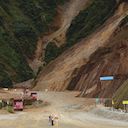
Irving Howe: A Socialist Life
If Howe’s intellectual evolution has meaning for today’s left, it is to be found in his struggle to transcend sectarian mindsets while remaining principled.


If Howe’s intellectual evolution has meaning for today’s left, it is to be found in his struggle to transcend sectarian mindsets while remaining principled.

After the civil rights movement, John Lewis moved from protest to politics. But he remained optimistic about the Black freedom struggles of the twenty-first century.

The fate of the Southern labor movement helps us understand why the United States took a sharp right turn over the last half-century—and points to a path for transforming the country today.

The ideals of the Confederate South found new force in the bloody plains of the American West.

Critics argue that anti-discrimination law fails to challenge the fundamental inequalities of society. For Filipino-American workers, however, it became an important organizing tool in the fight against segregation and unsafe conditions on the job.

In Resource Radicals, Thea Riofrancos explores how conflicts between left movements and the left government in Ecuador produced a militant critique of the extractive model of development.

Constitutions are often conceived as elite projects. The Indian example illustrates that founding texts can have unexpected meanings for popular politics.

In the era of global capitalism, imagining the lives of others is a crucial form of solidarity.

In The Feminist and the Sex Offender, Judith Levine and Erica R. Meiners pull back the curtain on the history of the sex offender registry and explore how we can strive to reduce sexual harm without mass incarceration.

As millions rise up against police violence, a white father and his Black son discuss racism, resistance, and empathy.

In Nicaragua, Honduras, Guatemala, and El Salvador, authoritarian and corrupt politicians have found fertile ground.

Contemporary automation discourse responds to a real, global trend: there are too few jobs for too many people. But it ignores the actual sources of this trend: deindustrialization, depressed investment, and ultra-wealthy elites who stand in the way of a post-scarcity society.

The structural conditions shaping care work are highly exploitative—and are profoundly linked to the high degree of COVID-19’s spread within both long-term care facilities and the communities that supply their labor force.

If Democrats win the U.S. election, it is time for a progressive reset in relations with Africa: a new foreign policy, centered on economic justice and the democratic aspirations of the continent’s youth.
The pandemic has exacerbated an existing child care crisis. Platforms like Care.com are growing, while exposing care workers to new forms of surveillance and discrimination.